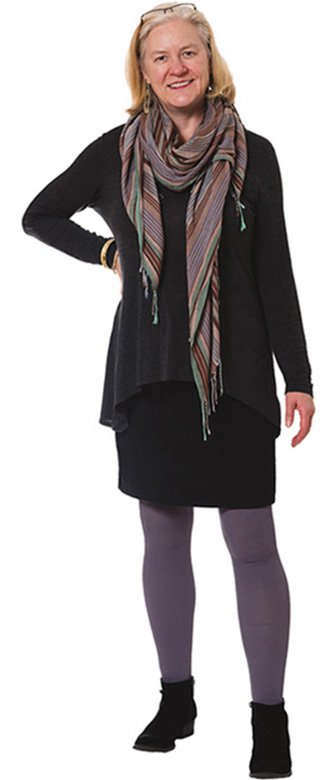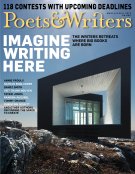Ten years ago, Sarah Browning and a group of fellow poets founded Split This Rock, a literary nonprofit that works at the intersection of poetry and political activism and hosts the biennial Split This Rock Poetry Festival: Poems of Provocation & Witness in Washington, D.C. Browning recently announced that she will step down from her role as executive director of the organization at the end of the year, and that the search for her replacement will begin after this year’s festival, which will be held from April 19 to April 21. With her final year at the organization underway, Browning discussed her past decade at Split This Rock, the continued need to consider poetry a form of social engagement, and the upcoming festival.

Sarah Browning (Credit: Kristin Adair)
What changes have you seen in the literary world since starting Split This Rock?
When we started this organization, there were very few literary organizations engaging in activism. I went to the Association of Writers & Writing Programs Conference in 2003, three weeks before the United States invaded Iraq, and I could find only two sessions that engaged political questions at all. We were actively being told not to write political work fifteen years ago. That’s why we started D.C. Poets Against the War [a movement in 2003 to protest the war in Iraq] and then Split This Rock, which emerged from that movement. Split This Rock brought the activism piece into the picture. Now, of course, everybody is focused on making change with their poetry and doing so more explicitly. But I’m telling you, ten years ago, there was no home for it. And that’s why we built it.
The name “Split This Rock” comes from a poem, doesn’t it?
It does, from a Langston Hughes poem called “Big Buddy.” It ends with, “When I split this rock, / Stand by my side.” So it’s about splitting the rock of injustice but also the solidarity that’s needed—that need for community.
How does Split This Rock make poetry and activism accessible?
We try to bring poetry into as many spaces as possible and encourage everyone to write. We host community writing workshops twice a month in D.C. They’re free, drop-in; all you have to do is show up. The room is physically accessible, with transcription service for people with disabilities. You don’t have to have an MFA or any educational experience or introduction to poetry. We believe that, as Roque Dalton wrote in a poem, “poetry, like bread, is for everyone.” And our programs prove it. People are hungry for the imaginative language of poetry and for the authentic voice of one another, the heart-language, because so much of our experience is mediated now by propaganda, by commerce, by social media. We’re being sold to all the time. So we’re hungry for more authentic experience, and that’s what poetry is: It’s idiosyncratic language; it’s weirdness and wildness.
What would you say to those who might suggest that poetry and activism are incompatible?
Writers have always engaged the world around them. And as a writer you have to write what’s pounding up inside you. And if what’s pounding up inside you is injustice—if there’s a mother who has to work two jobs just to get food on the table, or if you are that mother, and you’re writing late at night and hoping there’ll be enough food to get you through the end of the week to the next paycheck—then that’s what you’re writing. That’s the poem. That’s what’s going to have power: What is the fire in your belly?
Nobody should tell anybody else what to write. I’m not telling anybody what to write. These poems were always being written; they just weren’t finding a wide audience because journals weren’t publishing them. The guidelines were saying, “No causes.” The contests weren’t awarding these poets the awards. The universities weren’t giving these poets the jobs. Because of racism, and because of conservatism. And homophobia and sexism. Split This Rock was founded to help these poets, like myself, feel less lonely and be more effective as poet-citizens, so that we could join together when we wanted to do activism—but also to amplify our voices and to create our own platforms.
Split This Rock cites Federico García Lorca’s concept of duende as one of its core values, which is described on your website as “recognizing the potential imaginative power of fear and embracing poets and activists who grapple with difficult issues and take risks in their writing and public work.” Why are fear and risk both necessary to move things forward?
It ain’t easy. None of it. We’re not going to make change if we stick to platitudes and simplicity, either in our poetry or in our social justice work. So we have to go to dark places, difficult places, in ourselves and in our relationships with one another and in our society. And that’s hard. I think it certainly helps us to sometimes be patient with one another. Split This Rock is one of the few places in the literary world, but really anywhere, where folks who are twenty-one and folks who are seventy-six are hanging out in the same room, having conversations. And maybe they have radically different cultural references and life experiences. So duende informs that because it’s scary to say, “You know, I don’t actually know anything about what you’ve just said.”
I’ve never studied poetry formally, so even when I’m with a bunch of academics and they use terms that I don’t know, I have to say to them, “Guess what, I don’t know what you’re saying!” [Laughs.] Which is a scary thing for me to say. I try to face my fear. But it’s at all levels, and we have to do it at all levels: personal, creative, collective, national. I’m the descendant of slave owners. I write about that in my work and I’m trying to push that, hard. I don’t know how my extended family’s going to feel about it, let alone other white people from the South. I wasn’t raised in the South, only half my family is from the South, so I’m going to be treated as an outsider, but that’s an issue where I feel like we have to face our fears as white Americans.
What guests and panels are you excited to feature in this year’s Split This Rock Poetry Festival?
Sharon Olds has been added to the lineup, which is really great news. She was supposed to feature at our very first festival in 2008 but was unable to come. Likewise, Sonia Sanchez kicked off our first festival and she will be back to mark this tenth anniversary. But also we have young poets like Paul Tran and Terisa Siagatonu. We always try to honor voices of all ages and in all places in their writing lives.
This being the first festival under the new political regime, we are particularly interested in how poetry is being used in resistance and in how poets are taking care of themselves and one another. We’re all feeling a lot of despair, I think, and we heard that in the proposals we received. There are a lot of sessions about using sadness, about using rage—in our poetry, but also in our community building—and acknowledging these things as real. Crying. Holding one another in celebration and in support.
What’s next for you—writing?
Yes. I don’t do well without structure, even this late in my life. I’m thinking about grad school. But at the very least, I would like to have more time for my own poetry and creative nonfiction. My second book just came out, but it was ten years between books. It would be nice not to have ten years till the next one.
Nadia Q. Ahmad is the Diana & Simon Raab Editorial Fellow at Poets & Writers Magazine.









